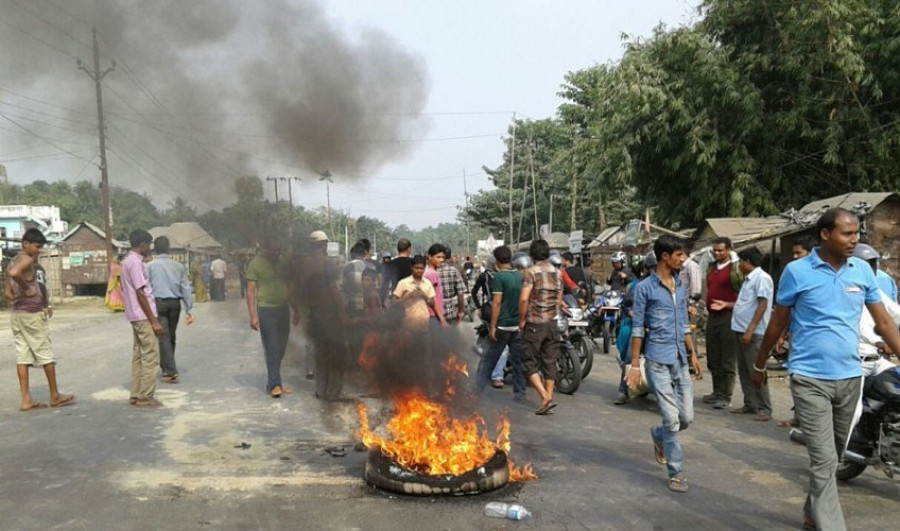National
When will the government make Lal Commission report public?
Experts say parties fear releasing the report could antagonise security officials.
Tika R Pradhan
Prime Minister Pushpa Kamal Dahal on Thursday told Parliament that he was in favour of making the Lal Commission report public but could not do it because of an order by the Supreme Court.
The Supreme Court on April 3 last year, in response to a writ petition by Chief Secretary Shanker Das Bairagi, had issued an interim order against immediately releasing the report. Bairagi had moved the court after the National Information Commission ordered the government to provide the report to some individuals who had sought it.
These contradictory moves from the government officials [the prime minister saying he wants to make the report public and the chief secretary opposed to the idea] show that the bureaucracy is reluctant to publicise the report, which, according to reports, has implicated authorities for using excessive force against protesters during the 2015 Madhesh movement.
Chief Secretary Bairagi had moved the court to prevent the release of the report when Sher Bahadur Deuba was the prime minister and Dahal’s CPN (Maoist Centre) was the key coalition partner.
Now the question is whether the government really wants to publicise the report.
Many think that the obstruction caused by the court can be removed if the Prime Minister’s Office wants to do so because the chief secretary may withdraw the case if the prime minister instructs him to do so.
However, the Office of the Attorney General, which is the official legal adviser to the prime minister, says it is not that simple.
“One may withdraw the case if the situation develops in that way, but the court’s order can’t be withdrawn,” Attorney General Dinmani Pokharel told the Post.
Though the prime minister told Parliament that he was willing to release the report, he at the same meeting also added that it was also a matter linked to law and order. And, he minced words there.
“Sometimes it becomes inconvenient to make such reports public from the viewpoint of maintaining law and order and public well being. The government has also made some key aspects of the report public,” Dahal said in Parliament. “It is also an international practice that some reports may or may not be made public in view of the sensitivity of the subject and its impact on the country’s law and order.”
Officials said release of the report also depends on whether the government wants to help the NIC. Making the report public is one of the major demands of the Nagarik Unmukti Party, a ruling party.
According to an NIC commissioner Ratna Prasad Mainali, the NIC has written to the Finance Ministry through its line ministry—the Ministry of Communication and Information Technology—to provide the necessary funds to hire a lawyer which even doesn’t need a Cabinet decision.
“Unless we get the funds for legal consultations to defend our decision at the Supreme Court, the issue will remain pending,” Mainali told the Post.
The NIC has already been facing a funding crunch after the government reduced the budget, and has been asking the government to provide an additional budget for hiring a lawyer to defend its decision.
It’s been more than six years since the report was handed over to the government, but like several other reports it is gathering dust in government drawyers.
Security experts have said the reluctance of the government to release the Lal Commission report could be due to the opposition by security agencies and the home administration, which are mostly implicated by such investigations.
“Though we have not read the report, we can assume that the security agencies and the home administration could be reluctant to publicise the report,” said Hemanta Malla, a security expert and former DIG of the Nepal Police. “Since they happen to be on the frontline during such movements, they fear the commissions could have found them guilty.”
The report was produced by a team led by former Supreme Court Justice Girish Chandra Lal after a detailed investigation into the months-long protests in the run-up to and following the promulgation of the constitution in September 2015.
The commission was formed in February 2016 during the second stint of the current Prime Minister Pushpa Kamal Dahal and it submitted the report to the then-prime minister Sher Bahadur Deuba on December 16, 2017. But the report has been gathering dust.
A Tharu leader Rajkumar Lekhi, who is currently a Madhesh Provincial Assembly member from the UML representing Saptari 1A, claimed that the political leaders were afraid of security forces and the bureaucracy because they know that the report has implicated them for the loss of lives and properties.
“Another reason for the government’s reluctance is because they are biased against the Tharu community—since those convicted in connection with the Madhesh movement are neither from the NC, UML or the Maoist Centre,” Lekhi told the Post. “Leaders fear security bodies and bureaucracy will go against them if the report is revealed.”




 13.12°C Kathmandu
13.12°C Kathmandu














